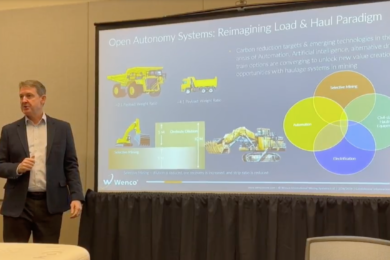A strategic move to jointly evaluate the known lithium potential of the Lake Johnston region in southern Western Australia as a source for feedstock supplying into a locally-sited lithium concentrate plant, has been announced by advanced lithium processing technology developer, Lithium Australia NL (LIT) and Poseidon Nickel Ltd (POS).
Under a Memorandum of Understanding (MoU), LIT and POS will undertake due diligence and negotiate key commercial terms to underpin a proposed final agreement to jointly explore for lithium hosted pegmatites on tenements held by both Poseidon and LIT at Lake Johnston and Ravensthorpe.
The parties will also assess the viability of utilising Poseidon’s 1.5 Mt/y Lake Johnston concentrator (which is currently on care and maintenance) to process lithium ores and produce a saleable lithium concentrate and downstream lithium chemical production.
An aerial view of POS Lake Johnston operations is shown. The facility was placed onto care and maintenance by Norilsk Nickel in 2013 and tenements, plant and equipment remain in good standing. The Lake Johnston operation is a 1.5 Mt/y processing facility that includes three ball mills, two flotation circuits, multiple thickeners, filters and a large concentrate storage facility.
Additional infrastructure at Lake Johnston includes existing tailings disposal cells, a bore field and water treatment plant, large mine workshop and maintenance facilities, administration buildings, functional laboratory and metallurgical laboratory, plant stores and workshop areas, medical centre and emergency response control centre. The site power is supplied by a local power station.
LIT and POS combined tenement package at Lake Johnston and Ravensthorpe covers an area of ~1,000 km², significantly improving each company’s prospectivity for discovering lithium mineralisation.
The move is the latest under LIT’s strategy to underpin lithium chemical production from all lithium silicates, including lithium micas and spodumene. It has developed the SiLeach® process to capitalise on lithium sources not previously exploited for the production of lithium chemicals. The principal focus for future potential lithium chemical production is lithium minerals rejected by industrial processes, including off-specification materials rejected by lithium mineral producers.










